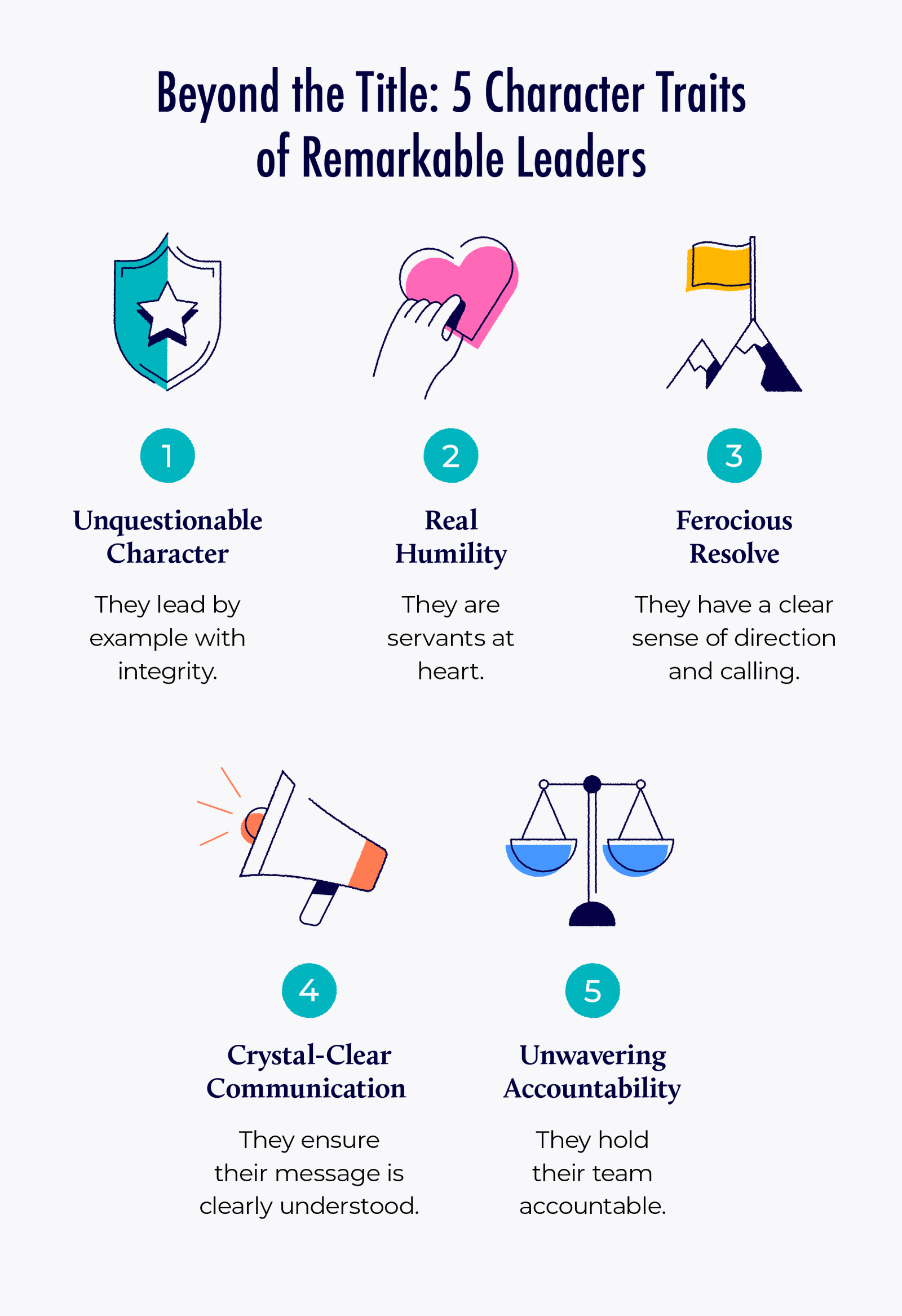Welcome to Leadership Series
This article is part of a series titled “Welcome to Leadership“. Sign up here to receive the rest of the articles in this series. You’ll also subscribe to my newsletter called The Better Leader Newsletter. It’s filled with leadership insights, must-read articles and other high-quality, engaging content designed to help you flourish as a leader.
I have said it before, and I’ll say it again: great leaders share common traits that separate them from the pack.
We’re currently in a series called Welcome to Leadership. In the introductory article, I set the stage for what this series is and what it isn’t. I listed three guiding principles that govern the reasons for why this series exists. I encourage you to read it before any of the other articles in the series.
Then, in Part 1, I talked about the fact that you don’t know what you don’t know, and how you handle that reality speaks volumes to who you are as a leader.
And in today’s article, I’m going to discuss 5 key character traits that are true of every great leader.
Before I begin, I want to clarify my own definition of a leader.
A leader is someone who knows where they are going, walks in that direction and brings willing people along with them.
Now that we are clear on what a leader looks like, let’s discover the 5 key characteristics of a leader that’s truly great.
Key Takeaways
- The 5 character traits of great leaders are unquestionable character, real humility, ferocious resolve, crystal-clear communication and unwavering accountability.
- Great leaders focus on private victories before public influence; in other words, character before competence.
- There is a great leader inside of you, waiting to be discovered and harnessed in service to others.
1. Unquestionable Character
What you say and do says so much about you.
If you look at the origin of the word “character”, you will discover that it comes from the Greek word kharakter, which carries a few different meanings: “engraved mark”, “an imprint of the soul”, or “a tool used to mark”.
Consider the words that you speak and write. Each letter is commonly referred to as a “character”, a symbol with a specific meaning. The process of combining of these characters together forms the words we use to communicate with others.
In the same way, our thoughts, habits, intellect, temperament, intentions, and motives all combine to form our character.
Character can then be described as the sum of all the qualities that define an individual.
Great leaders have unquestionable character. So what does that look like?
It’s difficult to describe unquestionable character, as it typically is a “I’ll know it when I see it” gut feeling. But describing questionable character? That is easy, and we can start there.
I have a favor to ask of you. Answer the following questions:
- Are you who you say you are?
- Do you do the things you say you will do?
Deep down, you know you miss the mark. I know I do, and if you are honest with yourself, you don’t measure up to the answer you would give to others.
Maybe it is habitual lateness. Maybe it is consistent unresponsiveness. Maybe it is using others inappropriately to get what you want. Maybe it’s laziness, cowardice, deceitfulness, arrogance… the list could go on.
We all have character defects, but great leaders stand out based on how they respond to them:
- They are intimately aware of their character flaws, and they actively compensate for them.
- They routinely follow through on their word with actions that are consistent with what has been communicated.
- They communicate clearly, to the appropriate people, when they miss mark.
- They willingly accept and welcome feedback on how they are leading and where they can improve.
In short: great leaders have alignment between who they say they are and how people experience them.
Perfect? No, but the people you lead aren’t looking for someone who is perfect and always right. They are looking for someone who is consistent and always real.
Unquestionable character creates an atmosphere of trust, and trust is foundation upon which all of your leadership successes (or failures) are built.
So, I’ll ask you again, and be honest with yourself:
- Are you who you say you are?
- Do you do the things you say you will do?
The greater the alignment between the answers to those questions, the greater the influence and impact you will have as a leader.
2. Real Humility
It’s unfortunate that I need to distinguish the type of humility I am about to describe.
I am not talking about the oft seen humblebrag, where Joe Schmoe is posting #blessed to disguise pride-in-accomplishment as humble thankfulness. You just can’t fake it.
I’m talking about real humility. Tim Keller’s definition of humility, real humility, looks like this:
Humility is not thinking more of myself or less of myself but thinking of myself less.
In his book Good to Great, Jim Collins distinguishes between 5 different levels of leaders. Levels 1-4 all have varying degrees of difference, from communication skills to knowledge to competence. Level 5 leaders, however, are found to be exceptionally rare.
There are only two distinguishing factors between Level 4 and Level 5 leaders: humility and resolve. And in summary, those Level 5 leaders are ordinary people who produce extraordinary results.
Real humility is an extension of unquestionable character. It is the strong inward desire to elevate others instead of yourself, and it does so without strings attached.
Great leaders are humble in that they understand who they are in relation to others, and they don’t think of themselves any more or less than they should.
They genuinely seek the good of those around them, even if it means they don’t get noticed. They sacrifice their own glory for the glory of others, and they make it a point to do so!
But why humility?
People listen to and follow leaders that make them feel heard, appreciated and cared for. You simply cannot do this if your interests are always put before others.
Great leaders share the character trait of humility because great leaders are servants at heart. They humble themselves so that others may be lifted up, and in doing so, they change the world.

3. Ferocious Resolve
While unquestionable character and real humility are the building blocks of exceptional leaders, they must be accompanied by what I call “ferocious resolve” in order to make substantial impact.
Exceptional leaders have a special gift – willful determination – to do whatever it takes to make their organization great. They are laser-focused on achieving their organization’s goals and will not stop, even if all visible options have been exhausted.
To be sure, this does not mean they use dishonest tactics to get what they desire. That plainly makes their character questionable.
Rather, they have a clear, undeniable sense of direction and calling to make things work.
That clear, undeniable sense of direction and calling is called resolve. It is a fixity of purpose that is instilled deep inside of someone that compels them to continue marching forward.
Average leaders? They have a fuzzy sense of direction and calling. They are cloudy on the details of where they are going. The result is people who are hesitant to follow them.
Great leaders, on the other hand, have clear sight of the path ahead and step forward with resolve. They are confident in where they are going, even if they details have yet to unfold.
People want to follow that type of leader. Why?
Because they appear unshakeable, even in the midst of trials. They are fixated on accomplishing the mission and vision they have set forth, and they’ll do whatever it takes to get there with their people.
Do you have ferocious resolve? Are you crystal clear on your purpose and direction? Is the incurable desire to create the future evident how you lead?
Great leaders have ferocious resolve. They know where they are going, and they figure out how to get there without losing their people.
And they will do whatever it takes to make the organization, and the people within it, look good in the process.
4. Crystal-Clear Communication
Poor communication is one of the leading causes of organizational and relational disfunction.
In the book 12: The Elements of Great Managing, Gallup surveyed more than 1 million employees to identify the essential elements of a healthy workplace.
The #1 response of those employees? “I know what is expected of me at work.”
Great leaders are crystal-clear communicators.
Crystal-clear communication must meet these 5 criteria:
- Right words.
- Right way.
- Right person.
- Right place.
- Right time.
Think of all the scenarios where you said the right words at the wrong time. Or maybe you got the right place and the right time, but you delivered your message to the wrong person.
Or worse yet, you got the right person, place and time, but you said all the wrong words in the wrong way. I’ve been that person more than once.
At its core, communication is simply the exchange of thoughts, ideas and information between people. However, this is only one side of the equation; what you say must be understood for it to be effective.
This is what makes great leaders stand out from the crowd. They take 100% of the responsibility to communicate. Not only do they ensure that their message is clear – they ensure that the hearers have clearly understood their message.
One of the best questions to ask to ensure you have been clearly understood is this: What did you hear me say?
Great leaders are masters at crystal-clear communication. They speak the right words, in the right way, to the right person, in the right place and at the right time.
5. Unwavering Accountability
What good is it if you have unquestionable character, real humility, ferocious resolve and crystal-clear communication… but fail to produce results?
Many could-be exceptional leaders never measure up to their potential because they lack the ability to hold both themselves and their people accountable.
It can be difficult to hold people accountable. I don’t know of any leader who enjoys the task, but great leaders understand its importance.
Accountability is the compass to goal achievement. It is there to course-correct when people have wandered from the proper path.
Most average leaders are mediocre when it comes to holding people accountable. They are afraid of damaging friendships, anxious about losing key employees or terrified of having fingers pointed back at them for their own lack of measuring up.
And when push comes to shove, average leaders gloss over the difficult conversations when deep down they know better.
Great leaders make certain their people understand what is expected of them and what they are responsible for – and hold them to it.
Why?
Proper accountability produces tremendous results, and in the long run, tremendous people.
Great leaders realize that unwavering accountability is a crucial component of any successful organization. They step into that responsibility, and they lead others to do the same.
A Great Leader Is In YOU
You’ve probably thought of someone who doesn’t match this criteria. “My boss is not an exceptional leader”, or even “My spouse definitely doesn’t fit this description”.
You may have ventured to think of someone who has all the qualities of a great leader, but let’s be honest: this type of person is few and far in-between.
It’s easy to find leaders who fit most of the good character traits listed above.
Maybe they are especially gifted at communicating with exceptional clarity, have an unflinching determination to make things happen and hold people accountable for their contributions, but they are egotistical, controlling, demeaning and deceitful in their tactics.
Or maybe you know someone in a leadership role who has unquestionable character, real humility and clear communication, but they change courses at every bump in the road and never seem to care about how people are performing.
I get it, and I’ve been there. I’ve even been both those people before, and the odds are you have too.
But here’s the thing: great leaders were once average.
The key difference is that at some point in time, they became acutely aware of their character defects and made deliberate efforts to change.
For me, it was a passing conversation with a colleague that clued me in to some alarming comments regarding my leadership. I know others who have spouses that loved them enough to have a candid, hard talk. Yet others still in other various avenues: counseling, performance reviews or good friends.
I don’t know what moment needs to happen in your life to make you acutely aware of the key leadership traits you lack. Nor do I know the words you need to hear that begins the process of change in your leadership.
It could be reading this article that creates a defining moment in your leadership journey.
What I do know is that there is a great leader is inside of you, waiting to be unleashed and harnessed for the betterment of those around you.
Will you dig deep and uncover it for yourself?
I hope you will, because the world around you needs great leaders.
This article has been fun to write, as I’ve been able to revisit content I’ve written in the past. It’s a testament to how I’ve grown personally, and it’s a reminder that you can grow too.
Let’s take a quick look at what’s next in the Welcome to Leadership series:
- Welcome to Leadership Part 3: Leading Yourself You will have an exceptionally difficult time leading others if you cannot lead yourself. I talk about how to lead yourself well and the practices that accompany those already doing it.
As always, if you have enjoyed this free content, please pay it forward by sharing with others. You can quickly share on social media using the buttons available in the article, or you can email the content to a friend or colleague.
Until next time,
Thomas







Leave a Reply